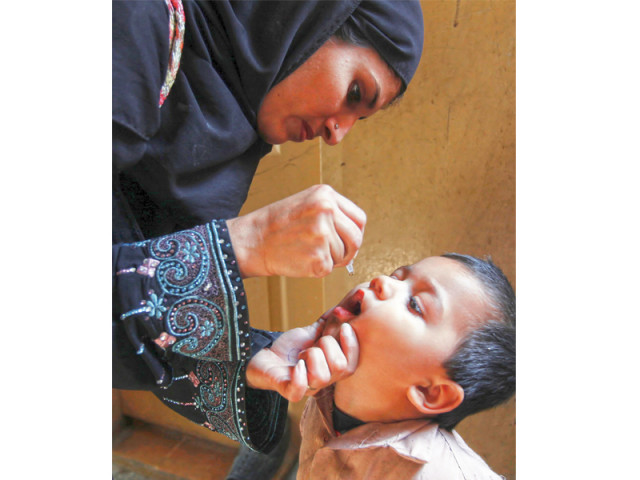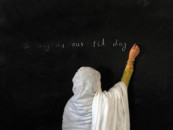Fearing attacks, workers left to fight polio on their own
The ban on motorcycle riding is not being imposed.

A polio worker administers polio vaccine drops to a boy in Karachi, where two cases have been registered this year. PHOTO: FILE
As many as 52 polio cases have been registered in the country since the turn of the year but despite the worryingly high number of cases and the threat of terrorism that polio workers face, relevant officials still remain lax in their approach.
The polio campaign
Provincial officials and law enforcement agencies had earlier decided to impose a ban on motorcycles in the 25 union councils of the city where the polio campaign was to be launched. More than 90% of the cases in the city since 2009 had been reported in these areas. The residents of this area often deny their children access to polio drops and there is also the added threat of violence as some of these areas are controlled by banned terrorist organisations.

After the attacks on two polio teams in Qayyumabad in Febrary, which killed three workers, the polio drive was divided into four different categories. Keeping in mind the sensitivity of the areas, the provincial government decided to launch different drives in the areas. Deployment of police was to be increased while a complete ban on motorcycles was announced.
Ban? What ban?
However, that was not the case on Sunday as motorcyclists drove around the areas as police officers deployed with the polio workers claimed that it was not their responsibility to uphold the ban. “We are on high alert and have been directed to only concentrate on the protection of polio workers rather than to implement other orders,” said a police official patrolling with the polio works in Gadap Town. “It is the responsibility of the police whose jurisdiction this area falls under.”
Some police officials were not even aware of the ban. “Yes, people are driving their motorcycles here. I didn’t know that there was a ban on it,” another police official told The Express Tribune. Another officer cut in. “Why would there be an issue if people are riding motorcycles?” he asked before revealing his gun. “The workers are safe because we are with them.”
However, no official was willing to take the responsibility of the non-enforcement of the ban on Sunday. “The orders should be followed and implemented by the area police,” said the additional home chief secretary, Niaz Ali Abbasi. “Why have citizens not lodged an FIR if orders are not being implemented?” he asked, before claiming that he will investigate the matter.
“I’ll take up the issue in the next meeting with the relevant officials,” said Dr Mazhar Khamisani, the head of the provincial Extended Progamme on Immunisation (EPI) department. “It is very risky if orders are not followed.”
Meanwhile, the Karachi commissioner Shoaib Ahmed Siddiqui said he will enquire with the relevant authorities. Expressing shock at the lax attitude towards the security of the polio workers, he promised that he will put an end to this. ”We will ensure that this issue is resolved as soon as possible and the orders are implemented strictly from next Sunday, when the drive resumes again.”
The polio workers
Meanwhile, the polio workers just wanted to concentrate on the task at hand rather than to focus on anything else. “I know there are threats but I have work to do,” said a female worker as she wiped the sweat off her forehead. “I have noticed that a few motorcycles have gone by but my job is to complete the job and the police’s job is to implement the orders they have been given.”
Despite the tough task that they have been handed, the polio workers were not being treated especially well. “I have to arrange my own lunch,” informed a polio worker. “We also arrange our own drinking water. They [the government] give us Rs250 per day and arrange for our transport from the office to the field but provide for nothing else,” informed another worker, who seemed uneasy in sharing the information due to presence of EPI officials.
The polio bags had some ice cubes with polio phials. The polio workers claimed that they were not given the ice cubes despite the heat. “The officials should monitor if the workers have adequate ice in such a situation,” informed Dr Khamisani. “However, it is the responsibility of polio workers to ask area officials for ice cubes if they are short of them.
Published in The Express Tribune, April 28th, 2014.



















COMMENTS
Comments are moderated and generally will be posted if they are on-topic and not abusive.
For more information, please see our Comments FAQ